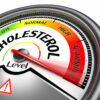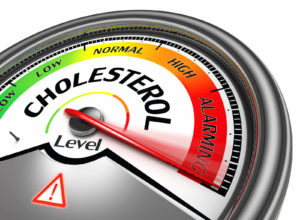
Is There a Connection Between Cholesterol and Cataracts?
High cholesterol is one health issue most people have some sort of connection to. With dietary patterns being what they are these days, many people will suffer from elevated cholesterol levels in their lifetime. High cholesterol levels can contribute to the development of atherosclerosis (the hardening and narrowing of the arteries). This makes a person more likely to suffer a heart attack or a stroke. This is why it’s extremely important to keep cholesterol levels down to help prevent heart disease. Some reports say that there is a connection between high cholesterol and cataracts. Is this true? And, how can you get your cholesterol levels under control?
What Is Cholesterol?
Before we answer that question, let’s make sure we are all on the same page about what cholesterol is. Cholesterol is a form of fat that runs through the blood. We get it from our livers naturally as well as the from the food we eat. Cholesterol is crucial for the brain and other organs functioning. However, the amount our bodies need is minuscule. In fact, we only need one type of cholesterol, which is called high-density lipoprotein (HDL) cholesterol. HDL cholesterol goes back to the liver to be broken down. The bad kind of cholesterol, low-density lipoprotein (LDL), stays in the blood and sticks to the walls of our blood vessels.
Most people consume more cholesterol than their body needs, which leads to high cholesterol levels in their body. Some people have a predisposition to high cholesterol levels because of family history. It also comes from being overweight or not being physically active. In some of these cases, you have control over the amount of cholesterol in your system. However, you may not be able to control the hereditary influence over your body’s predispositions.
What Are Cataracts?
Understanding what a cataract is is crucial to understanding the connection between cholesterol and cataracts. Cataracts are a clouding of the lens of the eye. They impair vision by preventing light from passing through the lens the way it should.
There are a few things people do to increase their risk of developing cataracts:
- Expose their eyes to ultraviolet light without protection (proper sunglasses)
- Smoke
- Have high blood sugar
- Have high blood pressure
- Use steroid medications
Is cholesterol a contributing factor in the development of cataracts? Not directly, but medications used to control it have been linked to an increased risk of cataracts.
Cholesterol and Cataracts Connection
 Some people believe there is a direct connection between cholesterol and cataracts. But, it seems to be less of a direct threat and more of an indirect one. It is an indirect threat by two means – an unhealthy diet and the medicine used to lower high cholesterol.
Some people believe there is a direct connection between cholesterol and cataracts. But, it seems to be less of a direct threat and more of an indirect one. It is an indirect threat by two means – an unhealthy diet and the medicine used to lower high cholesterol.
A healthy diet is important for all bodily functions. This includes your eyesight. A diet that is high in cholesterol is not healthy. If a person is eating a diet rich in vitamins and minerals and low in fat, they are less likely to develop food-related health issues.
When taking care of your body and eyes, consider reducing the amount of high cholesterol, fat, and sugar items in your diet. That means limiting the amount of fast food and processed foods you consume.
There are plenty of foods that contain the essential vitamins, minerals, and nutrients for improving eye health and vision. And, many of them are delicious. For an eye-healthy diet, you need a blend of fruits, vegetables, lean proteins, and healthy carbohydrates. Add lots of leafy greens, sweet potatoes, fish, and water to your diet.
Vitamins to Improve Eyesight
Also consider adding an eye vitamin supplement, like our Ocu-Plus Formula. Not only will this improve your diet and thus the health of your body, but also the health of your eyes. You can improve high blood sugar and high blood pressure through proper diet. They’re both contributing factors to the development of cataracts.
The second connection between cholesterol and cataracts comes from the medicines that are commonly prescribed to lower cholesterol: statins. Statins work by clearing cholesterol from the blood. There have been several studies to assess the increased risk of cataracts among statin users. However, many of the studies that suggest statins lead to cataracts were tested on animals. Or, they didn’t use the rigorous research standards we expect to be used today. Recent tests and trials run by Johns Hopkins and tested on humans reported no connection between statins and cataracts.
Unfortunately, the general public isn’t aware of many of these studies. They still believe old studies and outdated facts. It’s up to the doctors and researchers to tell the public the true risks associated with these drugs.
You may be at risk of high cholesterol because of family history, physical inactivity, or poor diet. Consider what you can do to lower your cholesterol with your doctor. They might prescribe statins or other drugs or suggest natural methods like improving your diet.
Improve your diet to include healthier choices by cutting out high-fat foods such as fast food. Then, increase your intake of fruits and vegetables. Drink plenty of water and choose lean meats and fish over red meat. Get physically active by getting up and moving. The more you move, the easier it becomes. Although we can’t change our family history, we can choose to live the healthiest life possible, making your family history less of an influence.
Eye Damage Caused by High Cholesterol
One of the ways cholesterol can damage your eyesight is if the cholesterol breaks free from build-up in the arteries. It then goes into the bloodstream where it can then clog up the retina’s arteries. This would result in retinal artery occlusion. It can also cause macular degeneration because the buildup of cholesterol in the macular vessel slows down the amount of blood flow getting to the eyes.
Don’t wait until it’s too late. Start making changes in your lifestyle and daily routine now to prevent high cholesterol and vision-damaging risks. It’s so easy to make healthy, natural changes, like adding the right foods to your diet and exercising. Even if you have a family history of high cholesterol, it doesn’t mean you’re guaranteed to have it, too. Make an effort to get current and updated information about your options from your doctor. A little motivation and dedication can go a long way in the battle to maintain a healthy life and healthy eyes!
Our Rebuild Your Vision Ocu-Plus Formula Contains All 17 Vitamins, Minerals, and Herbal Supplements to Protect Against Cataracts!





How do you know that people taking statins don’t just get cataracts because of having higher cholesterol than the normal population? How can you be sure it’s from the drug? And not just being in the high cholesterol group?
Sorry your analyse is wrong I have a ” healthy Diät ” my cholesterol is considered as low very low but normal for vegetarian. And guess what I have cataract! And if statins cause cataract, it mean cholesterol is necessary for the eye and not the contrary, because statin lower the cholesterol, so it would reduce the cataract and not increased if you was true!
amazing recommendation. i droped my total cholesterol from 200 to 120 just by following what you recommend : no oil, fruits, veggies, whole grains and sport. after two years i can really appreciate friits and veggies. pizza and ice cream taste gross.
great summary thanks!